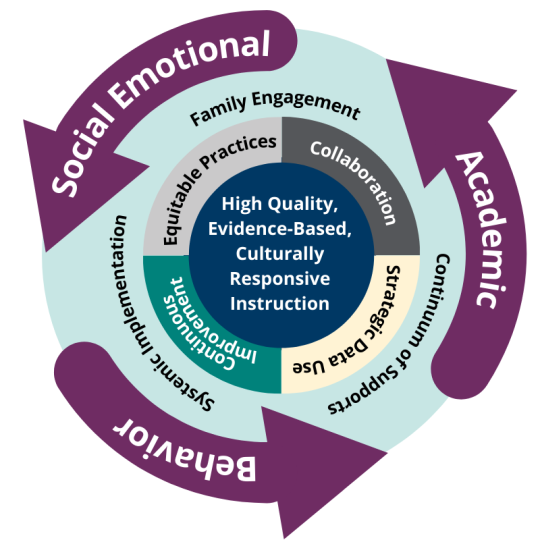Navigating the Road to Learning Recovery with MTSS
Date
Discover how to help school districts navigate post-pandemic challenges through the design and development of MTSS-aligned learning experiences and interventions that support all learners and staff.
School districts continue to address the slump in student achievement and increased behavioral challenges arising from the COVID-19 pandemic. While academic growth continues to meet or slightly exceed pre-pandemic norms, it has not been enough to fully compensate for the discrepancy in learning experienced, especially for students who have been historically marginalized. The initial response from districts to this concern was to supplement instruction with additional interventions and supports like summer school, tutoring, and small groups. However, not all interventions are equally effective or even effective for all learners, as efficacy is dependent on student needs, design elements, and the fidelity of implementation.
Frameworks for Supporting Today’s Learners
The Response to Intervention (RtI) model—a major policy shift in the landscape of learning intervention two decades ago—was a critical stepping stone to the framework used in school districts across the country today: Multi-Tiered Systems of Support (MTSS). Rather than providing interventions based on whether or not a student needs special education services, schools adapted the principles of RtI to better engage in highly effective core instruction as a whole. Moreover, MTSS is about more than just academic achievement, but also about addressing social, emotional, and behavioral challenges.
Just like the RtI model, the MTSS framework is built upon three tiers that increase in intensity based on learner needs. However, more emphasis on high-quality, evidence-based, and culturally responsive core instruction is at the heart of the framework. MTSS often encompasses not only an academic intervention model, like RtI, but also:
- Effective and sustainable professional development that builds all staff capacity
- Positive Behavioral Interventions and Supports (PBIS)
- Collaboration among all stakeholders to monitor consistency and enhance progress
- Strategic use of data for decision-making that includes culturally and linguistically inclusive universal screeners
- Family and community involvement
- Supports for learners at all levels, regardless of their “at risk” status

Providing Intervention Offerings that Districts Need
Districts are looking to companies for product offerings that support the implementation of MTSS at both the core instruction level and intervention levels.
Here are some ways you can enhance your current offerings to better address academic and behavioral gaps in alignment with MTSS frameworks:
- Evidence and Data: As state laws begin to set stricter standards for districts around high-quality curricula, district leaders are looking to companies to provide research on both core curricula and intervention products that meet ESSA requirements. Collect evidence that supports how student outcomes are tied to your product. We can help you compile and communicate this through case studies, whitepapers, and presentations, in an unbiased way that engenders more trust with education decision-makers.
- Differentiation Strategies: High-quality Tier 1 (core) curricula should include easy-to-implement, evidence-based instructional methods that make it easy for educators to address learner variability. Trained in universal design for learning (UDL), we can help you develop materials tailored to your product that address differences in academic ability, language proficiency, social emotional needs, or executive functioning abilities.
- Implementation Procedures: A major challenge for districts in implementing the MTSS framework is the time it takes to train staff with sufficient fidelity to implement appropriate interventions. Support customers by developing clear, easy-to-follow implementation procedures for educators, leaders, and specialists at varying levels of capacity to ensure fidelity in the delivery of interventions. With a solid understanding of how districts implement MTSS, we can help you design clear, step-by-step instructions, user guides, and support materials that make it easy for districts to adopt and follow intervention protocols effectively, leading to increased student outcomes.
- Evidence-Based Interventions: If you currently only offer core content, consider adding instructional practices or methods that have evidence to show that they are effective at producing results and improving outcomes when implemented. Consider utilizing practices from evidence-based sources like What Works Clearinghouse as a starting point. We can help you research, select, and develop proven practices into in-depth, thoughtfully designed math, reading, and writing interventions to incorporate into your solution.
- Sustainable Professional Development: Educators need to understand not only how and when to implement your product, but also how and where it fits their district’s MTSS model. Just as learners should be provided with varied levels of intensity and instructional support based on their academic and behavioral needs, so do educators. We can assist in creating online professional learning experiences and ongoing support structures like Communities of Practice that provide just-in-time support for users.
Effective interventions have the flexibility to serve the needs of learners, with fidelity of implementation. More and more, school districts expect the edtech industry to provide MTSS resources with their products to meet the diverse needs of their learners. Contact us to learn more about how we can help you enhance your offerings to address the academic, social, emotional, and behavioral needs of learners and make your product a part of every school’s MTSS implementation.

